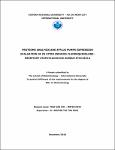| dc.description.abstract | Objectives: The objective of this study was to compare global protein expression changes after fluoroquinolone (FQ) exposures and efflux pump expression between FQ-resistant and FQ-susceptible S. aureus strains. Methods: The seven protein samples (S. aureus ATCC 29213, six in vitro induced FQ-resistant S. aureus strains) were extracted via sonication in rehydration buffer (RHB), cleaned by using 2D clean-up kit and quantitated by using RCDC protein assay kit. The protein samples were analyzed by using two-dimensional polyacrylamide gel electrophoresis (2-DE, pH range 3–10) and 8-plex isobaric tag for relative and absolute quantitation (8-plex iTRAQ) method combined with LC-MS/MS analysis. 2-DE gel images were then analyzed by DECOCON Delta 2D software. The differentially expressed proteins from iTRAQ analysis were searched for their gene ontology annotations (UniProt database) and protein-protein interaction networks (STRING v10.0). For verification of proteomic data, the expression of recA and mgrA were checked by quantitativereal-time reverse transcription PCR (qRT-PCR). Additionally, the expression of efflux pump genes includingnorA, norB and norC,which are among the most important efflux genes in S. aureus,were also analyzedfor the initial S. aureus ATCC 29213 strain and six in vitro induced FQ-resistant S. aureus strainsby reverse transcription-PCR (RT-PCR). Results: Under 2-DE analysis, the change in the expression of proteins in FQ-exposed strains could be clearly observed. However, this method is labor- intensive and provided low-reproducibility data; therefore iTRAQ analysis has been applied.Under this high-throughput technique, 582 unique proteins of initial antibiotic-sensitive S. aureus ATCC 29213 and the FQ-resistant ones were identified at a confidence level > 95% (unused cutoff >1.3). After a strict filtering for proteins with significant expression changes, 147 unique proteins were identified. Gene ontology searching result showed that the development of FQ resistance had significantly altered various proteins involving in SOS response (RecA), antibiotic resistance (MgrA), stress response (Alkyl hydroperoxide reductase subunit C, ClpB, ClpC, ClpL, ClpX, HslU, L-lactate dehydrogenase 1 and 2, SAV1710) and pathogenesis (Uncharacterized leukocidin-like protein 1 and 2, Immunoglobulin-binding protein Sbi, Triosephosphate isomerase, Enolase, EsxA, SaeR, SarA).Network analysis of antibiotic- resistant related proteins identified three major protein clusters which involved in ribosome structure, metabolic pathways and aminoacyl-tRNA biosynthesis. The qRT-PCR results of recA and mgrA expression were consistent with the data from the proteomic analysis. In addition, expression level ofnorA was unchanged whileexpression level of norB and norC was increased in all FQ-resistant strains. Conclusion: Resistance to multiple drugs including FQ under drug exposure generally requires the contribution of multiple proteins and processes. Among those, the global regulators, RecA and MgrA, with the significant up-regulation in all resistant strainswere strongly implicated to have important role in ourantibiotic resistance development model. Interestingly, we observed the increased expression of virulence genes together with the reduced antibiotic sensitivity. Furthermore, among the efflux pumps to be analyzed, norB and norC seemed to have important role in FQ resistance rather than norA. This study is the first study to analyze proteome of FQ-resistant S. aureus strains by using 8 plex-iTRAQ methodthatcould assist as a basis for future studies on the proteins implicated in the FQ resistance of S. aureus.
Key works: S. aureus, fluoroquinolone, resistance, proteomic, iTRAQ, qRT-PCR, RT-PCR | en_US |


